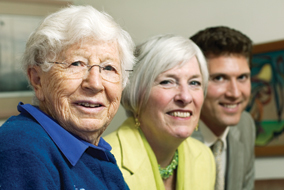
Ruth Hughes (L) and Clarissa Green gave Wayne Cousins the confidence to bring up end-of-life issues with his parents - photo by Martin Dee UBC Reports | Vol. 53 | No. 8 | Aug 9, 2007
Who Will Take Care of our Boomers?
Therapists, Priests and Engineers are Taking a UBC Certificate Course
By Lorraine Chan
Everyone ages. People just have different start dates.
And as the baby boom generation starts turning 65 in 2011, the greying of Canada’s population will only speed up. By 2026, the projected number of seniors will top 21 per cent – doubling their current share of the population to eight million.
“When you think of these demographic changes, it’s clear we need people in every sector who understand how aging is changing how our world is structured,” says Clarissa Green, an instructor for UBC’s Certificate in Working with an Aging Population Program.
“We need people who will make changes, such as longer walk signals at intersections, buildings designed to be ‘senior-friendly,’ communication styles that embrace changes in hearing and sight, policies that respect seniors’ needs,” says Green.
Offered by the Life and Career Centre at UBC Continuing Studies, the seven-month program equips participants with knowledge and skills they can apply to both professional and personal needs. The program is aimed at professionals who work with older adults, students in the health disciplines, community service providers, caregivers and family members. Curriculum addresses the physical, psychological, social, spiritual and community aspects of aging.
Green says enrolment is “extraordinarily eclectic,” with recent cohorts including engineers, massage therapists, rabbis, priests, engineers, retired teachers, financial advisors, accountants and a leader from the Sikh community.
“People in the program want to be more intelligent in how they understand and communicate with older individuals,” says Green, a UBC associate professor emerita of nursing and a therapist who works with families in crisis and transition.
Green designed the program in 1999 as a community resource for what was then the UBC Women’s Resource Centre. She made sure it would “engage both the heart and mind.”
“At the end of the course, students tell us, ‘I’m a very different person,’” notes Green. “Students leave the course with more acceptance of others and themselves as they age.”
Wayne Cousins, a retail accounts manager at BC Hydro, says one of the reasons he signed up for the course was to learn how baby boomers can have conversations with their parents about important issues like future living arrangements and health matters.
“With life expectancies increasing,” says Cousins, 46, “the ‘sandwich generation’ will spend more years caring for their aging parents than years spent raising their own children.”
Midway through the program, Cousins broached his parents about end-of-life care. The talk brought relief to both sides. “Many older people are willing to discuss these things,” says Cousins. “It’s their adult children who may be nervous about discussing end-of-life planning. Maybe some people are afraid they’ll jinx their parent’s good health if they bring up the subject.”
Cousins’ parents assured him that after enjoying 80-plus good years, they were ready to discuss matters that many families consider too delicate or taboo. “They said they’d preferred talking about all of this while they’re in good health and not during a crisis when it would put a lot more stress on me and my brother.”
In fact, Cousins’ mother asked him to help her plan her funeral service. “It sounds strange, but my mother enjoyed it because she gets to plan what her funeral will look like. Dad, on the other hand, doesn’t think it’s such a pleasant thing to talk about but he’s open to planning for it.”
The non-credit program typically accepts about 20 students each term and expects participants to function at the third- or four-year university level. Also teaching the program are JoAnn Perry, an associate professor of Nursing who specializes in gerontological nursing and family caregiving, and social worker Beryl Petty, an expert on community gerontology programs.
To promote cross-generational discussions, the program also invites seniors to provide their perspective. Ruth Hughes, 94, has been a guest lecturer since 2006. She brings wit, energy and a depth of experience that floors younger students, says Green.
“There’s a huge difference between the world view of a 25-year-old and that of a 94-year-old who has been around for a very long time and knows a lot a younger person can’t know. We want students to value and respect that difference.”
The next certificate program begins January 2008 at UBC’s Life and Career Centre – Continuing Studies at Robson Square. For information, call 604-822-0138, or visit: www.lifeandcareer.ubc.ca/aging. |
